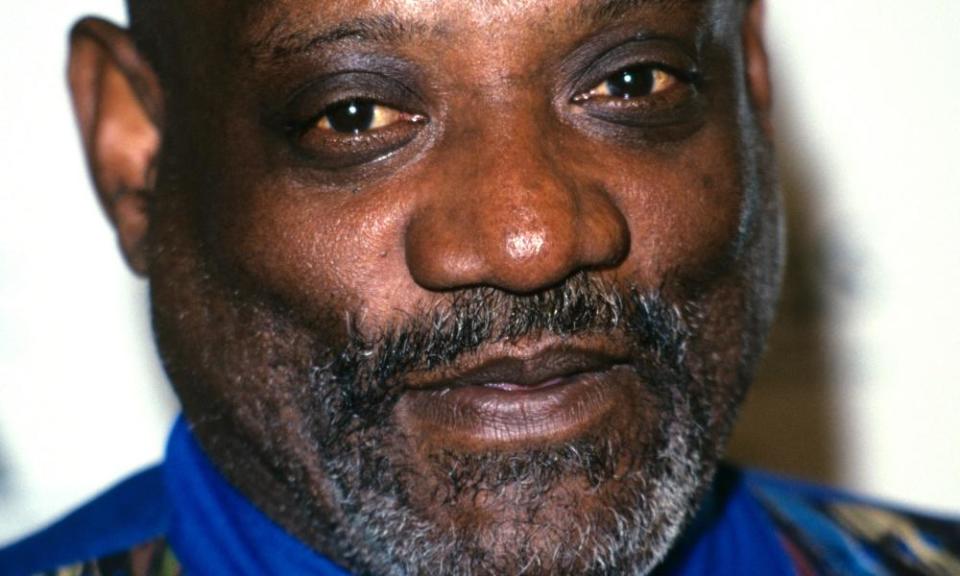Darcus Howe, writer, broadcaster and activist, dies aged 74

Darcus Howe, the broadcaster, writer and civil rights campaigner, has died aged 74. His family announced his death in a statement released on Sunday that read: “Darcus died quietly and unexpectedly in his sleep on the evening of Saturday 1 April. Our private grief is inseparable from our public pride.”
Howe, originally from Trinidad, lived in Brixton, south London, for 30 years and was well known for his Channel 4 series Black on Black and late-night current affairs programme The Devil’s Advocate.
In a hugely varied and influential journalistic career, he was also an editor of Race Today, wrote columns for both the New Statesman and the Voice, and served as chair of the Notting Hill carnival. His television work included the multicultural current affairs documentary The Bandung File, which he co-edited with Tariq Ali, and more recently White Tribe, a look at modern Britain.
Howe was a member of the British Black Panther movement and one of the “Mangrove Nine”, who were arrested and charged after protesting against repeated police raids on the Caribbean restaurant Mangrove in Notting Hill, west London, in 1970. At the Old Bailey trial, he successfully defended himself against charges of riot and affray.
In 1981, he organised a 20,000-strong “Black People’s March” in protest over the police handling of the investigation into the New Cross fire in which 13 black teenagers died.
The son of an Anglican priest, Howe first came to the UK aged 18 and had planned to become a lawyer, but instead found his calling as a journalist and activist involved in the struggle for racial equality.
Tributes were paid to Howe on Twitter. Bonnie Greer, the playwright and author, wrote: “RIP Darcus Howe. Truth teller and paladin for justice.” The film-maker Amma Asante tweeted:
May u RIP Darcus Howe. British #BlackPanther & a pioneer in the fight for #equality in UK.I enjoyed our last talk immensely & learned much. pic.twitter.com/fOi5wYy3fg
— Amma Asante (@AmmaAsante) April 2, 2017
The shadow home secretary, Diane Abbott, tweeted: “So sad to hear that Darcus Howe has passed away, One of the standout activists & public intellectuals of his generation.”
The shadow chancellor, John McDonnell, tweeted: “Sad to hear Darcus Howe has died. He was a courageous campaigner against injustice and for equality and civil liberties over decades.”
Farrukh Dhondy, a playwright and commissioning editor who worked with Howe in the British Black Panther movement and on Race Today, as well as on Channel 4, said he was deeply mourning the loss of a close friend of 45 years. “He was one of the most important immigrant activists that Britain has known. And his great gift was that he was a practical agitator for the rights of black people, and not simply a theoretician. He was, to describe it colloquially, a street-fighting man.
“It had powerful results. I am absolutely sure that the political parties and general political opinion shifted because of the agitation and stance that he, and others, took at the time in the Black Panther movement and in magazines like Race Today.”
Dhondy added that some of Howe’s main achievements came in the television programmes he fronted: “He gave a serious commentator profile – he wasn’t just a black actor ticking boxes for the BBC. He was a very good friend, and he would anything for his friends.”
Howe had recently been a consultant on Guerilla, a new six-part drama by the screenwriter of 12 Years a Slave, John Ridley, to be broadcast on Sky Atlantic. The TV series tells the story of an early 1970s underground cell that targets a special branch counterintelligence unit called the “black power desk”. A planned film telling the story of the Mangrove Nine trial in 1971, a case that exposed police racism, is also at an advanced stage.
Field said it was sad that Howe did not survive to see the series. “Darcus was an outstanding public intellectual, and political activist and organiser; in Diane Abbott’s words, ‘a living embodiment of the struggle for racial justice’,” he said.
“He played a crucial role in the movements and campaigns for immigrant rights in Britain. He acted as the first democratically elected chair of Notting Hill carnival in April 1977, in which role he defeated police attempts to restrict and relocate the carnival following the riot in 1976.”
In 2009, Howe wrote in the Guardian about his prostate cancer diagnosis and campaigned for more men to get tested, saying: “Long live the NHS. The campaign to persuade black men to get tested for prostate cancer starts here.”
Alex Pascall, broadcaster, journalist and oral historian, who presented Black Londoners on BBC Radio London and had known Howe since the late 1960s, described him as “undoubtedly one of our leading social architects”. “On politics of the Caribbean and the black movement in Britain, nobody can doubt that he has done his work,” Pascall said. “On the New Cross fire, that man did his work.
“With Darcus, you knew he was a man who could take a lead, and you could trust his leadership. Oh God, he was an intellectual. And fearless. The police hated him. He was great at debate, a tower of knowledge. We have really lost a dynamic person.”
Robin Bunce and Paul Field, whose biography Renegade, the Life and Times of Darcus Howe, has just been republished, were informed of his death by family members on Sunday. Field said Howe “was an outstanding public intellectual and politicial organiser and activist” as well as a “brilliant journalist and broadcaster”.
He went on: “It’s a huge loss to us and to all those who have been part of the movement for the rights of immigrant communities, and struggle for social justice more generally. His courage is the most striking thing. Darcus was brilliant, funny, defiant, against all the odds.”

 Yahoo News
Yahoo News 